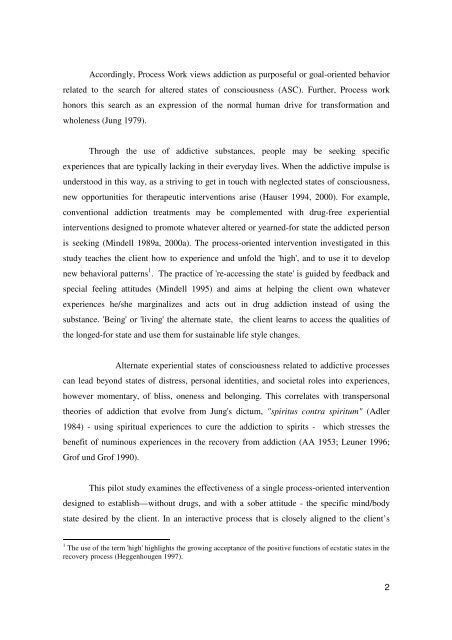article - Process Work, Reini Hauser
article - Process Work, Reini Hauser
article - Process Work, Reini Hauser
Create successful ePaper yourself
Turn your PDF publications into a flip-book with our unique Google optimized e-Paper software.
Accordingly, <strong>Process</strong> <strong>Work</strong> views addiction as purposeful or goal-oriented behavior<br />
related to the search for altered states of consciousness (ASC). Further, <strong>Process</strong> work<br />
honors this search as an expression of the normal human drive for transformation and<br />
wholeness (Jung 1979).<br />
Through the use of addictive substances, people may be seeking specific<br />
experiences that are typically lacking in their everyday lives. When the addictive impulse is<br />
understood in this way, as a striving to get in touch with neglected states of consciousness,<br />
new opportunities for therapeutic interventions arise (<strong>Hauser</strong> 1994, 2000). For example,<br />
conventional addiction treatments may be complemented with drug-free experiential<br />
interventions designed to promote whatever altered or yearned-for state the addicted person<br />
is seeking (Mindell 1989a, 2000a). The process-oriented intervention investigated in this<br />
study teaches the client how to experience and unfold the 'high', and to use it to develop<br />
new behavioral patterns 1 . The practice of 're-accessing the state' is guided by feedback and<br />
special feeling attitudes (Mindell 1995) and aims at helping the client own whatever<br />
experiences he/she marginalizes and acts out in drug addiction instead of using the<br />
substance. 'Being' or 'living' the alternate state, the client learns to access the qualities of<br />
the longed-for state and use them for sustainable life style changes.<br />
Alternate experiential states of consciousness related to addictive processes<br />
can lead beyond states of distress, personal identities, and societal roles into experiences,<br />
however momentary, of bliss, oneness and belonging. This correlates with transpersonal<br />
theories of addiction that evolve from Jung's dictum, "spiritus contra spiritum" (Adler<br />
1984) - using spiritual experiences to cure the addiction to spirits - which stresses the<br />
benefit of numinous experiences in the recovery from addiction (AA 1953; Leuner 1996;<br />
Grof und Grof 1990).<br />
This pilot study examines the effectiveness of a single process-oriented intervention<br />
designed to establish—without drugs, and with a sober attitude - the specific mind/body<br />
state desired by the client. In an interactive process that is closely aligned to the client’s<br />
1 The use of the term 'high' highlights the growing acceptance of the positive functions of ecstatic states in the<br />
recovery process (Heggenhougen 1997).<br />
2


